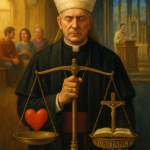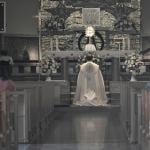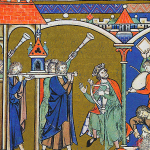Odesa, Ukraine, Nov 4, 2014 / 04:01 am (CNA/EWTN News).- Since Russia's annexation of Crimea in March, religious groups there – aside from the Ukrainian Orthodox Church (Moscow Patriarchate) – are facing persecution, and restrictions on their ministry. Religious communities in Crimea face an uncertain legal framework – they are unsure of what laws must be observed. Catholics, Ukrainian Orthodox of the Kyiv Patriarchate, and Muslims are all facing persecution from local authorities, and anticipate that they may have to go underground next year. "The so-called ‘Crimean government’ issued a new law under which all religious organizations, by the end of the year, must go through a process of re-registration,” explained the Ukrainian Greek Catholic Major Archbishop of Kyiv-Halych, Sviatoslav Shevchuk, at an Oct. 23 press conference. “The requirements are very complicated. But even if we fulfilled all the requirements, no-one would be able to guarantee the existence of our Greek Catholic community in Crimea any longer.” It is thus possible that in January 2015 the Ukrainian Greek Catholic Church will find itself outside the law, with its parishes and other property subject to confiscation. On Feb. 13 – barely more than a month before Russia annexed Crimea from Ukraine on March 18 – the Ukrainian Greek Catholic Church had expanded its presence on the peninsula, establishing a new exarchate dedicated to the territory. Today, the Archiepiscopal Exarchate of Crimea has five parishes, with Divine Liturgy celebrated at each of them. For political reasons, a bishop has yet to be appointed for the exarchate; but its administrators have exchanged married priests on the peninsula for monks, because the risk to priests with families is doubly dangerous. Among the Ukrainian Greek Catholic priests continuing to serve in Crimea is Fr. Bohdan Kosteskiy. He celebrates Divine Liturgy in Ukrainian, and says he can't abandon his believers now, because “the priest is a sign of hope for them.” In September, Fr. Kosteskiy was detained, along with a group of his parishioners, by “unknown police forces.” They were released after a few days in captivity. He was also briefly detained in March, three days before Crimea's official annexation, by pro-Russian forces. While the Ukrainian Greek Catholic Church was preparing for expansion in Crimea up until the peninsula's annexation, construction on its new parishes in Yalta and other Crimean cities has been halted. The legal uncertainty accompanying the process of re-registration makes continued ministry difficult for the Church. "The re-registering means accepting the annexation of Crimea as a legal fact; but to ignore this process would place the community outsidethe law, and be the actual start of an underground sector,” commented Alexander Dobroyer, director of the European Institute of Social Communications, in an interview with CNA. Dobroyer said the situation is further complicated by the lack of Ukrainian Greek Catholic bishops in Russia -- such parishes there are currently under the supervision of the Roman Catholic Church. He added that “if these communities are registered in Crimea, then there will be a chance to do the same in Moscow.” The sociologist, who studied at the Catholic University of Lublin, suggested that “on behalf of the needs of the pastor, they could just register and serve the people; but on the side of politics, that could give the Russian media the possibility of manipulating information, ultimately stating that the Ukrainian Greek Catholic Church has indeed recognized the annexation” of Crimea. Until lately, nine Roman Catholic priests worked in Crimea, but two were recently forced to leave the peninsula. Like the Ukrainian Greek Catholics, the Roman Catholics in Crimea have halted plans for the construction of new parishes. "We do not recognize the annexation of Crimea, because the Church is outside of politics,” Bishop Bronislaw Bernacki of Odessa-Simferopol told CNA. “There are processes that do not depend on us; but we must re-register our communities under the new Russian legislation in order to stay among our people. This puts deep fear in us.” Among the Roman Catholic priests exiled from Crimea was Fr. Dmytro Andriychun, a Dominican. “In Soviet Union it was the same system,” Bishop Bernacki said. “The special police call Fr.Dmytro for a conversation, and try to collaborate him. He said, 'I am a priest, so I can’t collaborate with any government.'” Bishop Bernacki continued, saying that “the Russian government doesn’t grant visas for priests, especially Polish priests. This could create a major problem with staffing. We actually can’t prepare for the future now; we don’t know what will come next.” Bishop Jacek Pyl, who is Auxiliary Bishop of Odessa-Simferopol and is based in Simferopol, told Aid to the Church in Need in September that “although … Crimea is under Russian rule, the Catholic Church can still exercise its ministry but we do not know how our future is going to look.” Alongside Catholics, the Ukrainian Orthodox Church (Kyiv Patriarchate) is also facing persecution by the Russian government in Crimea. It has lost control of six of its 15 parishes in the territory, according to a report of the Council for Europe. The home of the Church's Bishop of Simferopol and Crimea, Klyment Kushch, was burned down. "The UOC-Kiyv Patriarchate is in the most uncertain situation, as they have no canonical status within the Orthodox world," explained Dobroyer. The Kyiv Patriarchate was established in 1995 when a Russian Orthodox bishop in Ukraine, Filaret, attempted to distance his Church from the Russian Orthodox. The move led to the presence of two separate Ukrainian Orthodox hierarchies, one aligned with Moscow and one independent. And like Christians not aligned with the Russian Orthodox Church, Muslims have also been persecuted in Russian-administered Crimea. "Since March 18 young Muslims, Crimean Tatars, have disappeared there,” Said Ismagilov, a mufti and head of the Spiritual Directorate of Muslims of Ukraine, told CNA. “Some of them were found dead with signs of torture. We don’t know who is responsible for it, but this is too many young victims.” Tatars are an indigenous ethnic group of Crimea, most of whom are Muslim; they constitute around 15 percent of the population. Most boycotted the vote which led to Russia's annexation of their homeland, and wished to remain part of Ukraine. Ismagilov said that the mass disappearance of young Muslims is a sign of the beginning of religious persecution. In Yevpatoria, mosques, as well as Muslims' homes, have been raided by Crimean police looking for “extremist” literature: Russia has a list of such banned literature, which is legal in Ukraine. "The problem is that it is not only modern literature, but fundamental books of Muslim theology,” Ismagilov commented. “Even the second-most important book after the Quran – the 'Sahih al-Bukhari', a collection of sayings of the Prophet Muhammad – is also prohibited; but every Muslim mosque keep this in a private library.” “In fact the (prohibited) books are just an excuse for the control of Muslims, and an attempt to determine their loyalty to Russia's actions,” the mufti charged. "Persecution of Muslims in Russia has long been a problem,” Ismagilov said. “In more than twenty years of independence, Ukraine has never had such problems. I'm afraid that in Crimea, Russia will manipulate religious sentiments." An Oct. 27 report of the Council of Europe's Commissioner for Human Rights indicated abuses committed by Crimean authorities against both ethnic Ukrainians and Tatars. Crimea is a southern peninsula of Ukraine where nearly 60 percent of the population are ethnic Russians, and more than 50 percent of the population speak Russian as their first language. The territory was transferred from Russia to Ukraine in 1954 under the Soviet Union. It was annexed by Russia in March, in a move unrecognized by Ukraine and the West, following political unrest in Ukraine. The month prior, Ukraine's pro-Russian president was ousted by protests, and an interim government more favorable to western nations was installed. Ukraine held elections Oct. 26 which strongly reaffirmed the pro-western protests of early 2014 and rejected far-right nationalists. The political parties led by president Petro Poroshenko and prime minister Arseniy Yatsenyuk both won the largest number of seats in Ukraine's parliament, while the party of fomer president Victor Yanukovych won fewer than 10 percent. However, the elections did not include Crimea – annexed by Russia – or the regions of Donetsk and Luhansk, in far-eastern Ukraine, where pro-Russian separatists have declared independence and are holding their own polls. The separatists' elections will not be recognized by Ukraine, the EU, or the US, though Russia has already given them support. Since fighting began in the separatist regions in April, more than 3,700 people have been killed. Read more















